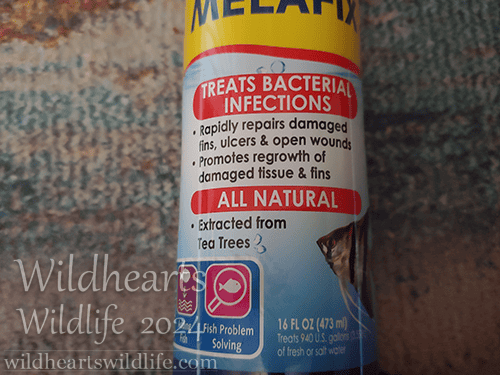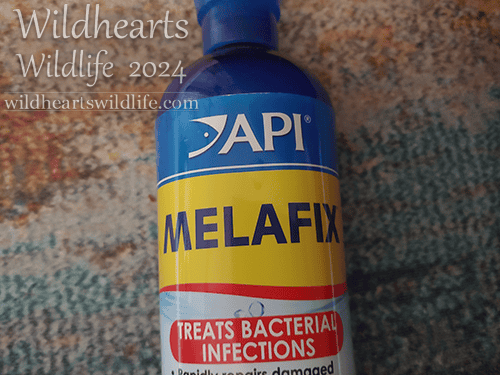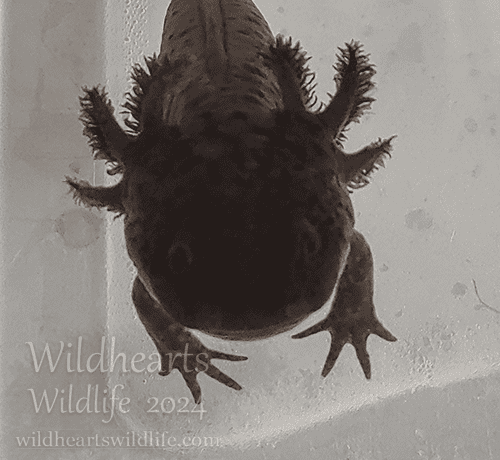Keeping axolotls can be a complicated beast. Although not fish, keeping them can be quite similar, in many ways, to fishkeeping. It’s important to remember, however, that, as amphibians, axolotls can be more sensitive than many types of fish. Like other amphibians, axolotls absorb chemicals and toxins through their skin.
In part because fish veterinarians are few and far between, it’s possible to buy some fish medications over the counter. It can be tempting, since they are also aquatic, to try using over the counter fish medications on our axolotls if they become sick. Of course when our derpy friends are not feeling well we want to help them heal as quickly as possible. However, it’s always important to double, even triple, check before using fish medications on axolotls. Not all of them are safe, and even ones that are may require a different dosage for axolotls than what you would use for fish.
What Is Melafix? What Is It Used For?

Melafix is an over the counter fish medication that claims to treat bacterial infections. It’s made from 1% cajuput oil, which is extracted from tea trees. Melafix is touted as being a more natural treatment that claims, in fish, to be effective against fin and tail rot, open sores, wounds, cloudy eyes, pop eye, and mouth fungus. It claims to help promote regrowth of damaged tissues and fins.
Melafix is mostly recommended for treating minor external sores or injuries.
This post contains affiliate links, notably Amazon affiliate links. If you click on one of our links and make a purchase we will receive a small commission at no additional cost to you. Thanks so much for your support!
Is Melafix Axolotl Safe?
I’m going to give a bit of a disclaimer here, I have never used melafix on axolotls myself. I have used it before on fish.
Melafix is, however, axolotl safe. Like in fish, in axolotls Melafix is sometimes recommended to treat minor, external sores. It’s not a strong medication so will likely not help if your axolotl is suffering from a serious infection. It also works on external issues only, so something like a mildly infected injury.
What Is the Dosage Of Melafix for Axolotls?
To err on the safe side, Melafix should be used on axolotls at half the dosage recommended for aquarium fish. My bottle of API Melafix recommends 5ml per 10 US gallons of water for fish, so that would mean using 2.5ml per 10 gallons of water for axolotl. Melafix can be used for up to a week if you are treating an infection or injury, or for a total of 3 days if you’re using it as a preventative with new stock.
The Effectiveness Of Melafix

A 2015 study done on goldfish and clownfish came to the conclusion that “Melafix had no significant bactericidal or inhibitory effect on any of the pathogens tested.” While some aquatics keepers do claim to have used Melafix successfully to treat various ailments, it’s difficult to decern whether Melafix had a therapeutic benefit of if their animals would have made a full recovery even without the addition of any medications.
Do I Recommend Melafix For Axolotls?

Honestly, at this time, I don’t personally recommend using Melafix for axolotls. It’s benefits against bacteria seems to be minimal at best, and useless at worst. In my opinion, it’s kind of pointless to expose axolotls to Melafix when it’s likely benefits are so minimal. Especially when there are other options for treating axolotls out there that are more time tested. What you treat your axolotl with will depend on what the issue is, but below I’ll leave some of my past articles about tea baths and methylene blue, both treatments I have personally used successfully in the past. In addition, if you’re looking for a gentle, natural treatment to help sooth minor wounds or injuries, I recommend using Indian almond leaves.
While Melafix is axolotl safe when used correctly, I can’t really think of a situation where I’d want to use Melafix rather than a more tried and true treatments, such as tea baths or a stronger antibiotic treatment for more serious infections. As always, it’s a good idea to check with an axolotl experienced exotic veterinarian if you have specific questions or concerns about your pet’s health.
———————
Unfortunately, Wild Hearts Wild Life has been dealing with content scrappers stealing our content and posting it to other websites without permission. If you’re seeing this article posted anywhere besides wildheartswildlife.com it means you are seeing it on a content scalper’s site. Please consider contacting us to let us know, and stopping by to visit on our actual site! Thank you!
